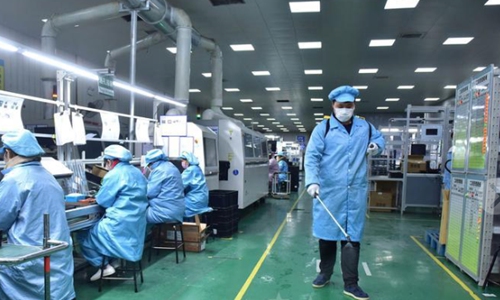HOME >> SOURCE
90% of smaller enterprises face serious cash crush: association
By Ma Jingjing Source:Global Times Published: 2020/2/26 18:43:57

A worker sprays disinfectant at an auto parts factory in Shijiazhuang, North China's Hebei Province, on Monday. Photo: CNSphoto
The majority of the small and medium-sized enterprises (SMEs) in China are at their most critical moment because of the novel coronavirus assault, as 90 percent of them will face challenges to survive a three-month manufacturing suspension.
The 'black swan' epidemic caught Chinese companies totally unprepared, especially the financially fragile SMEs, which may soon face a cash crunch if their business operations can't resume soon because of a labor shortage, disrupted logistics and virus control tasks.
"Our recent survey showed that around 86.5 percent of domestic SMEs said they felt a relatively heavy impact from the new virus, among which nearly 30 percent said the effect is 'very serious' and will lead to economic losses," Zhou Dewen, deputy director of the China Association of Small and Medium Enterprises, told the Global Times on Wednesday.
Tight cash flow is the biggest challenge, Zhou said, noting that nearly 90 percent of SMEs griped that their cash won't last three months.
As SMEs haven't been in full operations, 93.49 percent of them predicted a drop in revenue in the first quarter of 2020, with the average drop at 47.02 percent, according to another survey by the association.
It said about half of the companies polled have to bear costs of 50,000 to 500,000 yuan a month ($7,120-$71,200). As for a slew of difficulties they now face, the most remarkable ones are declining revenue, increasing operation costs as well as diminishing markets.
While seeking tax and fee cuts and flexible employment, Zhou said traditional companies should ramp up integration with the information and technology industry by developing online businesses.
Recently, the central and local governments have rolled out a slew of measures to support SMEs, including reducing electricity costs and social insurance contributions as well as delaying payment of housing provident funds.
Posted in: ECONOMY